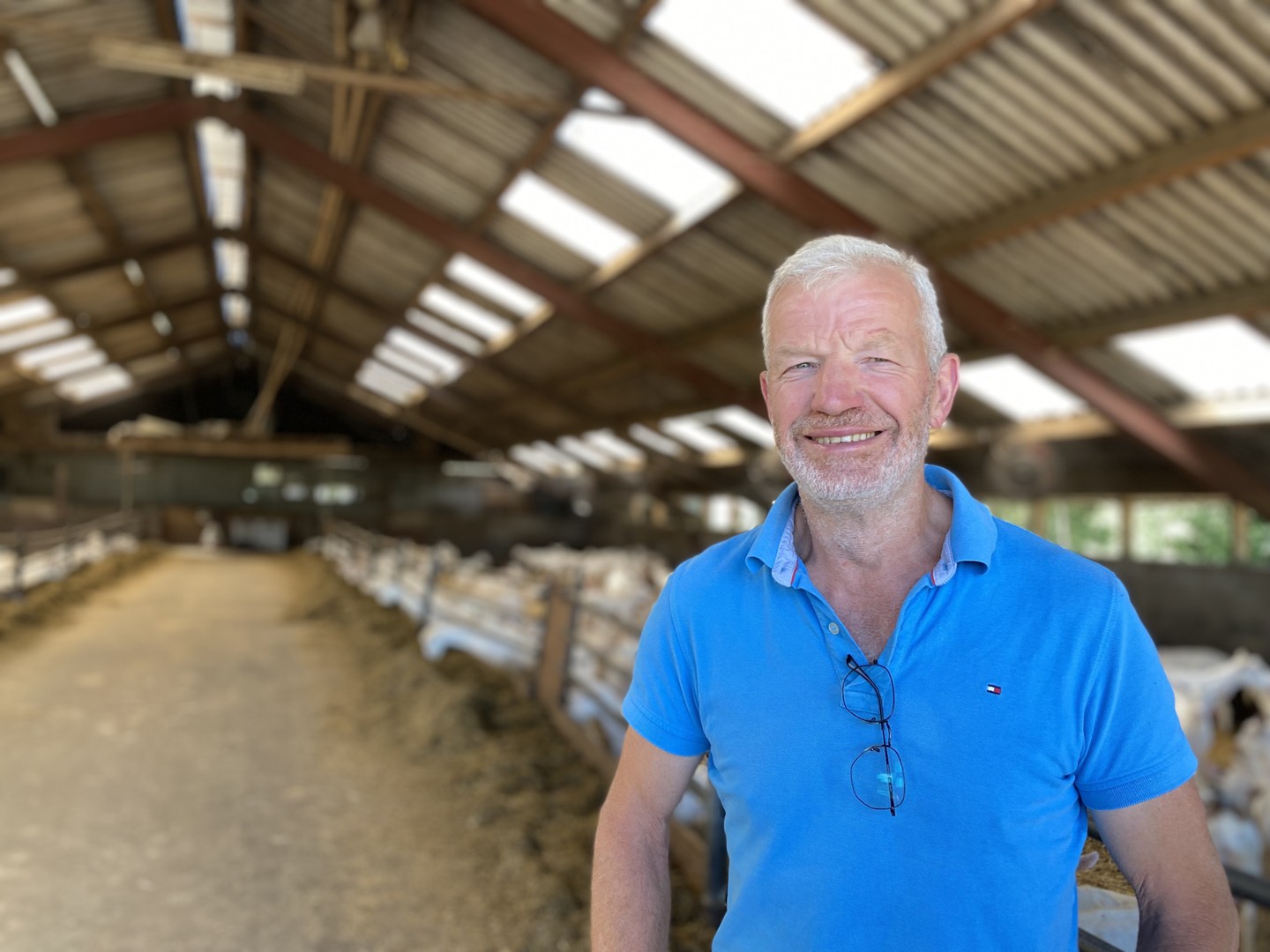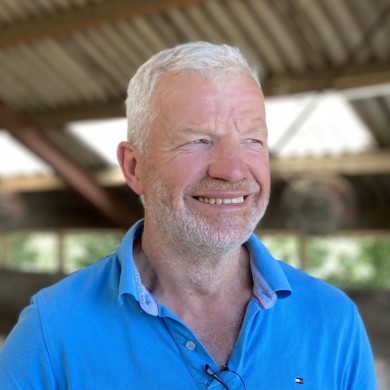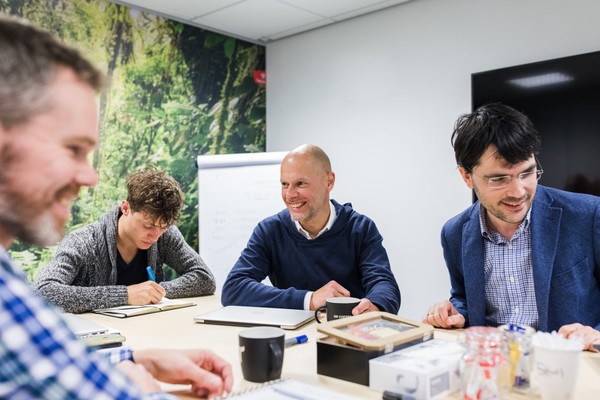cases >> De Zondebok
BUCK MEAT AND A POP-UP STABLE.

BUCK MEAT AND A POP-UP STABLE.
Farmers do not produce waste, only residual products. Nevertheless, goat dairy farmer Gerard Schroten noticed that male goats were often treated as waste. He felt it was time for a change, so he developed an innovative pop-up stable to keep the bucks for the production of goat meat. “It is my mission to prevent any animals from being disposed of as waste.”
100,000 bucks
The current situation is this: by law, newly-born bucks have to be kept at the farm for at least seven days. They may not be consumed within this time period, either. What happens next? “Then they are off to the slaughterhouse,” Gerard explains. “Your primary business is dairy, so you want to create as much room as possible for your dairy goats. As male goats cannot produce milk, around 100,000 of them are sent off to the slaughterhouse every year in the Netherlands. Their meat is not destined for human consumption, but used in the production of dog food, for example. In many cases, goat farmers actually have to pay someone to take the bucks off their hands. That does not seem right to me.”
Pop-up stable
Legislative changes are coming next year. Bucks have to be kept for three weeks instead of only seven days, and 50% of them have to be used for human consumption. Gerard is anticipating these changes with his ideas: a pop-up stable where the bucks can be kept longer before being processed into meat. “I asked myself: how can I properly fatten the bucks to make them fit for human consumption, and how can I create enough space to keep them?” Gerard says. “At the moment, many goat dairy farmers have little to no room to keep the male goats for a longer period of time. A farmer can place the pop-up stable on their property without first laying a foundation or acquiring a license. The units are modular, so they can be connected together. They also include a hygiene sluice. We call it the PUBB: pop-up breeding box. With that name, I also see opportunities on the international market.”
Exclusive meat
Then there was the question of how to market goat meat in the Netherlands. Gerard: “Buck meat is sold for tidy sums in Portugal and Spain. It is considered a real delicacy in those countries. I want that to happen in the Netherlands as well. I intend to bring the sausages to market with the help of sausage manufacturer Dreug . Another party is currently testing recipes for other snacks. For example, does goat meat taste good in a croquette or the classic bitterball? What is the best flavor? We are also talking to exclusive restaurants about the possibility of adding goat meat to the menu. Because a single buck contains less meat than, for example, a pig, we have to market it as a more exclusive product. We have to make sure that all bucks can be processed, so they are no longer seen as waste to be disposed of.”
Text continues below the video.
Validation at the Zwarte Cross
Do the sausages taste good? Visitors of the Zwarte Cross festival had a clear opinion about that. “Gerry Hemink of the Innofood Foundation and innovation broker at TKI Agri & Food helped me out with my goat meat idea. She thought my case was a good match for the Rabobank’s Food Forward track , whose finale was held at the Zwarte Cross. People got a chance to taste five different types of sausages made from goat meat. They could then use colored pins to indicate whether they thought the product tasted good, neutral, or not good. In the end, almost everyone had dropped their pin in the ‘tasted good’ box! That was a promising initial validation.”
Collaborating with other sectors
What about the validation and development of the PUBB? “Jorieke Adolfsen at Novel-T facilitated the innovation process. She has been incredibly helpful. She also put me in touch with Kamphuis Konstruktie , and I got in touch with ColPro via Petra Deterink. We are producing the PUBB with these collaboration partners. I did not want to do everything on my own because I am busy enough as it is with the goats. It is wonderful to work together with innovative entrepreneurs from other sectors.” Jorieke adds: “Gerard had been working on his ideas for years and things had to come together one way or another. In light of the upcoming legislative changes, this was the perfect time to take things to the next level.” Gerard may call on Novel-T for help again in the future. “Now that we have developed several business models and determined their costs, we may need some additional support with the chain organization. It can be difficult to maintain focus on the innovation process when you also have your day-to-day business to think about. Novel-T’s support ensures there is sufficient continuity, and I would advise any entrepreneur to sit down for a meeting with them to discuss the possibilities.”
Future vision
Gerard would not be surprised if his ideas represented the future of goat dairy farming. “I hate to see meat and animals go to waste. There is far too much of that at the moment. My ideas tie in with the new legislation, but they offer other advantages as well. For example, the PUBB can also be used as a quarantine box because it is made of plastic, which makes it an inhospitable environment for bacteria.” Gerard says goat meat also fits well within a climate-conscious lifestyle. “Goat meat is fairly lean, unprocessed meat, which makes it very healthy. It is similar to chicken meat, except for the fact that chickens are full of hormones. That is not the case with bucks. My goal is to keep the chain as short as possible for both products to limit emission levels, among other things. With the PUBB and the market introduction of goat meat, goat dairy farmers can fatten the bucks themselves, use a single transporter to transport them to the slaughterhouse, and then on to the distributor. In other words, there are several benefits to eating more goat meat. It is my hope that no more animals are disposed of as waste.”
Are you ready to take your innovative idea to the next level? Contact Jorieke Adolfsen !

"I hate to see meat and animals go to waste."
Gerard Schroten
Goat dairy farmer and inventor of the PUBBMore about
De Zondebok
Farmers do not produce waste, only residual products. Nevertheless, goat dairy farmer Gerard Schroten noticed that male goats were often treated as waste. He felt it was time for a change, so he developed an innovative pop-up stable to keep the bucks for the production of goat meat. “It is my mission to prevent any animals from being disposed of as waste.”






